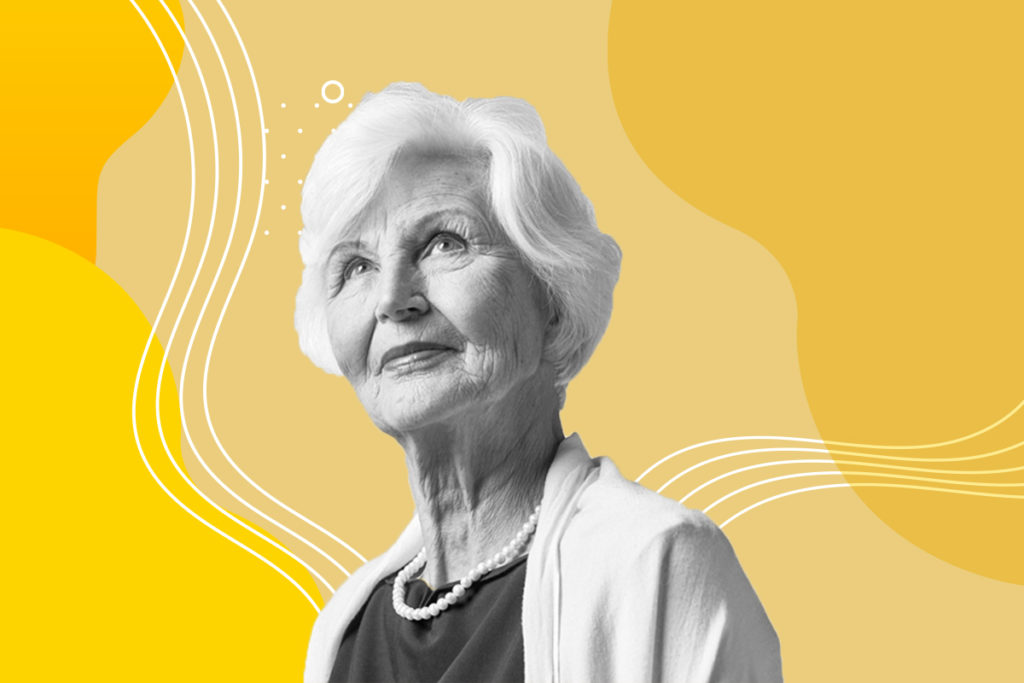
Some of the links on this page may link to our affiliates. Learn more about our ad policies.
What Is Menopause?
Updated on: December 2022
Reviewed by: Nancy Leahy, RN, APNP

Menopause is a monumental moment in a woman’s life. It officially marks the time when she is no longer fertile following 30 to 40 years of fertility. It is a process that every woman goes through, whether naturally or induced, so it’s important to understand the entire process that leads up to this point—and what happens afterward.
Find What You Need
When Does Menopause Happen?
Menopause occurs in every female at a different time. There isn’t one certain age where menopause definitively starts. The average age for a woman to start menopause is 51, though the process can start from mid-40s to mid-50s.
There are some general factors that play into how early or how late a woman goes through menopause:
When their mother went through it: This is the most telling sign as to when women will go through menopause. “Menopause is strongly genetically linked, so you’re very likely to fall within a few years either way of the age your mother was at menopause,” said Nanette Santoro, MD of the University of Colorado-Denver’s School of Medicine.
Chemotherapy:
Women being treated for cancer with chemotherapy may be introduced to the symptoms of menopause early, though rarely does chemotherapy directly start the menopause process. Chemotherapy can also damage the ovaries, causing menopause to be escalated or delayed. After chemotherapy is completed, it’s natural for symptoms to last for years.
Smoking:
Studies have found that smoking—even just for a couple years in your younger years—can cause you to undergo menopause years earlier. Smoking also increases the variance at what age you undergo menopause, making the process far less predictable.
Ethnicity:
In a study of more than 95,000 women with no history of breast or ovarian cancer, it was found that black women and white women experience menopause, on average, at about the same age. Latina women, though, usually go through menopause earlier than usual, and Japanese women experience it a bit later.
All of this is presented to show that, while there isn’t too much of a variance between ethnicities and when women start menopause, ethnicity paired with other lifestyle factors like smoking and health can move the sliding scale of when menopause starts.
There are some factors that have been perceived to play a role in when a woman goes through menopause, but the following DO NOT play a role in when the process begins:
- The age when you get your first period
- How often you have used birth control
- How many times you got pregnant or breastfed
How Long Does Menopause Last?
Just as there’s no specific age when menopause starts, there really isn’t an exact time the process ends once it does begin.
The Cleveland Clinic states that the perimenopause process (discussed later) lasts an average of about four years, though some women have been known to finish the process in just several months. A woman is considered to have reached menopause when she has not had her period for 12 months, and this year is included in the average menopause stage. At its most severe lengths, the whole menopause process can take up to 10 years in some women.
What Happens When Menopause Occurs Earlier Than Usual?
Menopause can happen earlier than expected, and this occurrence is called premature menopause.
Premature menopause occurs in 1 percent of women, meaning about 1.5 million Americans suffer from the condition every year. Premature menopause occurs if you start the menopause process before the age of 40. Its likelihood increases if they have experienced primary amenorrhea (failing to have your first period until 16) or secondary amenorrhea (not having your period for three or more months despite the absence of pregnancy).
There are other genetic and lifestyle-based reasons that play into the likelihood of premature menopause occurring:
- Autoimmune diseases: There are certain autoimmune diseases like mumps, Addison’s disease, and various thyroid diseases that can cause premature menopause. Suffering from these autoimmune diseases at one point in a patient’s life has been reported in about 30 percent to 60 percent of premature menopause cases. These diseases can enter the ovaries and affect estrogen production.
- Diet and BMI: As Healthline points out, estrogen is stored in fat, so the thinner and lower MBI you have, the more likely it is that you could start the menopause process sooner. It has also been found that a lack of exercise and a vegetarian diet also play a factor in having early menopause.
- Smoking: Just as smoking can cause you to start menopause a couple years early, it can cause a complete premature instance of the process.
- Hormone-releasing drugs: Drugs like Lupron and Syranel can cause your ovaries to fail, in addition to advancing the likelihood of endometriosis.
Because menopause indicates the start of the infertile period of a woman’s life, premature menopause can be devastating for a slew of reasons. Primarily, premature menopause causes women still in their 30s to no longer be able to have children. Menopause before 40 has also shown an increased likelihood in osteoporosis and cardiovascular issues like heart disease.
How Does Menopause Happen?
Menopause is a natural occurrence.
The process of menopause begins when your body starts to produce less estrogen. Over time, your body will eventually cease making estrogen, and you will stop having your period because of this. Your ovaries, which produce the estrogen, no longer release the eggs through ovulation because they aren’t being produced by the hormones inside the ovaries. This whole process— before the official ceasing of periods and production of estrogen—is called perimenopause.
Once your body no longer releases the eggs and you stop having periods, you have reached menopause. (According to one study, having “pause” in the medical term is misleading because menopause is anything but a pause—it is a permanent stoppage of fertility and periods.)
Once your body no longer releases the eggs and you stop having periods, you have reached menopause.
Nearly every woman will go through menopause naturally. The only way a woman will not naturally go through menopause is if her ovaries were removed. There are reasons why a woman’s ovaries have been removed, with the leading reason being a risk of ovarian cancer. Some women carry genes called BCRA1 and BCRA2, both of which increase womens’ risk for breast and ovarian cancer. Women with either one of those genes who remove their ovaries via surgery reduce their risk of getting ovarian cancer by up to 90 percent. (The surgery also helps reduce the chance of breast cancer by 50 percent.)
A side effect of this, however, is that ovary removal almost immediately sends the woman’s body into feeling the effects of menopause due to the lack of estrogen. Because of the sudden drop in estrogen levels, the symptoms of menopause like hot flashes and mood swings (discussed later) hit you very quickly, as opposed to the more gradual process in which they onset when menopause happens naturally.
The Symptoms of Menopause
During the entire process of reaching menopause—from premenopause to perimenopause to after you no longer have periods—your body goes through physiological changes because of the lack of estrogen. This causes your body to adjust, which can lead to bothersome and long-lasting symptoms that indicate you are entering or nearing menopause.
The rate at which these symptoms occur differs for each woman, but overall, most women have reported experiencing these symptoms. Let’s take a look at them and why they occur during menopause.
Irregular Periods
This is the most obvious symptom of menopause. By the time women start the perimenopause process, they have been having their periods for about 30 to 40 years, nearly every month, save for when they are pregnant or other medical-based instances. But as menopause gets underway, periods occur less frequently, and it’s natural as the body is producing less estrogen.
During menopause, periods last for a shorter amount of time, they happen far less frequently, and they often start to happen on a much more randomized schedule. Bleeding during perimenopausal periods becomes unpredictable, too, as you may bleed more or less than usual, and that varies per period.
It’s still possible to become pregnant during perimenopause. However, the absence of periods for a couple months may also mean pregnancy or another medical condition, especially if this occurs before you’ve officially been diagnosed as perimenopausal despite feeling other symptoms.
Hot Flashes
A hot flash is a rapid heating of the body. The feeling usually starts in your torso and moves all the way up to your neck and head, causing your skin to redden and beads of sweat to start forming while the body tries to naturally cool itself down. They’re called “flashes” because the episodes usually last for about one minute to five minutes. They can happen anywhere from a couple times a week to, in their most severe forms, 20 to 30 times per day.
Hot flashes are one of the most common symptoms of perimenopause and menopause, with up to four in five women experiencing them at some point. More than a quarter of women say their hot flashes come so frequently and are so intense, it affects their quality of life. One study reports that women who are heavy drinkers and have anxiety and depression have been found to experience more severe hot flashes and more intense symptoms of menopause, too.
Essentially, hot flashes are related to the decrease in estrogen in the woman’s body. Once your body starts to feel hot, your brain triggers blood to rush to the surface of your body and cool it down, thus causing the sweating and the quick cooling down of the body.
Hot flashes occur as long as the menopause process does (up to five years or so). But one study found that more than half of women who have undergone menopause have experienced hot flashes for seven or more years. “Women should not be surprised if their hot flashes last a number of years,” said Nancy Avis, the lead researcher on the study. Some women report feeling them into their 70s and 80s.
Night Sweats
Similar to hot flashes, where your body regulates a sudden increase in core temperature by sweating, a natural symptom of menopause is night sweats. Night sweats are essentially caused by hot flashes when you sleep.
Night sweats, known in the scientific world as “sleep hyperhidrosis,” can be very mild but also severe enough to where they wake you up multiple times per night. The bouts of sweating, like hot flashes, are caused by a decrease in estrogen, but there are other factors that can play into the issue. They include the following:
- Environment: Chills are a symptom of menopause. If a woman is suffering from this, she may choose to sleep in a warmer and more comfortable sleeping environment. Once the body stops suffering from the chills, however, the warm sleeping space can heat the body up quickly and cause night sweats.
- Medication: It has been reported that medications like antidepressants and zinc supplements can cause excessive sweating, especially at night. Because you may be taking certain medications to help calm other symptoms of menopause, the night sweats could be a result of the medication rather than a natural internal heating and cooling in your body—especially if it’s only happening at night.
There is not one specific reason for night sweats, so it’s important to find out exactly what is causing the night sweats before chalking it up to menopause.
Mood Swings
Menopause-induced mood swings are caused by a hormonal imbalance due to the decreasing amount of estrogen in your body. These mood swings can be severe, especially if you have been diagnosed with PMS before menopause, and there is no real warning sign as to when they are going to happen. One minute, you can be happy and smiling; and the next, you’ll find yourself crying and in a depressive mood only to find yourself back to happy a couple minutes later.
In addition to the direct medical reasoning of mood swings, there is also a varying range of reasons that fuel why a woman’s mood can change:
- The realization you are becoming infertile
- Other menopausal symptoms are affecting your personal and work lives
- A decreased sexual libido
- You have been depressed in the past
It’s important to dissect the difference between feeling depressed and having mood swings because of menopause and clinical depression before seeking help on the issue. While the former may not need to be treated immediately or with antidepressants (but rather hormone-balancing medication), the latter is a serious medical issue that needs professional help.
Vaginal Dryness
During menopause, the vagina can lose its moist feeling because of the lack of estrogen. The body naturally lubricates the vagina to keep it clean, and while some can feel dryness before the menopause process starts, many women report a continued dryness during the menopausal period. The tissue around the vagina becomes thinner and less flexible when dry, causing an overall change in its appearance.
Primarily, vaginal dryness can cause irritation and itching. It also puts women at a greater risk for infection, because there is no longer a lubricant to help prevent diseases and infections. Additionally, dryness can cause an uncomfortable feeling—even pain—during sex and other common activities like sitting, exercise, and urination.
While this symptom usually starts during perimenopause, it is common for vaginal dryness to continue after you’ve reached menopause. It’s been found that more than half of women aged 51 to 60 experience this condition.
Weight Gain/Affected Metabolism
Because of the lack in estrogen and imbalanced hormone levels created during menopause, your body’s metabolism gets thrown off balance. This can cause the body to start to store fat (which is where estrogen is usually stored and continuously cycled through) at a higher rate, especially around the waist and hips.
Weight gain is usually not solely caused by a hormone imbalance, but rather a combination of factors like aging, diet, and exercise habits. Because metabolism slows down after menopause, they need to eat less to maintain the same weight. It also means exercise is even more important than before when it comes to maintaining weight. The more muscle your body has and the more consistently you exercise, the more efficiently your body burns calories, helping you maintain the weight you want.
Sleep Problems
As discussed before, menopausal symptoms like night sweats can cause women to experience issues with sleeping throughout the night. These symptoms are not themselves sleep disorders, and women can have issues with sleeping not related to other menopausal symptoms. The hormone imbalance is typically the root of these sleep problems and can cause:
- Inability to fall asleep
- Snoring and having trouble breathing when sleeping (sleep apnea)
- Waking up frequently
- Not concentrating on falling asleep and staying asleep
These are all issues that can in turn affect a woman’s life when she’s not sleeping, potentially causing a general tiredness, depression, and an inability to stay awake during the day and finish tasks.
PostMenopause
Most women are postmenopausal by their mid-50s. This does not mean that all the symptoms of the menopause process go away, though. In fact, many of the symptoms of the years following reaching menopause are similar to the perimenopause process.
Some similar symptoms of postmenopause include:
- Vaginal dryness and itchiness
- Weight gain
- Issues sleeping due to insomnia
- Urinary tract infections
These symptoms can last for a couple more years after reaching menopause. In addition to the symptoms, postmenopausal women are at a higher risk of developing blood pressure-related health issues as well as osteoporosis.
Health Problems Connected to Menopause
Reaching infertility is independent medical occurrence, meaning that once you reach infertility, it does not mean that you all of a sudden cured of any other medical issues (outside of ones related to periods and pregnancy, of course). After you’ve reached menopause, there are health problems both directly related and loosely related (because of age) to the lack of estrogen in your body and no longer having your period.
Osteoporosis
Osteoporosis is a condition where your bones become weak, causing them to be at greater risk for fractures and breaks. This disease progressively gets worse, and it usually isn’t discovered until you easily fracture a bone at an older age. If you have osteoporosis and break a bone, you are more likely to break the same bone again and more easily because it’s difficult to grow back strength in the bone.
Women over the age of 50 have the greatest risk of developing the disease, which falls just in line with the timeline of when women are either going through or reaching menopause. Osteoporosis is also related to the lack of estrogen that comes along with menopause. The Cleveland Clinic notes that after menopause, bone degeneration happens more frequently than bone regrowth, causing an overall loss of bone mass. That loss of bone mass can lead to osteoporosis.
There is no cure for osteoporosis, though there are recommended treatments including exercise (specifically lifting weights) in addition to supplements and medications.
Cardiovascular Disease
Heart disease is the leading killer amongst men and women, and once women reach menopause, the risk of a cardiovascular disease increases. Decreased estrogen levels are not the sole reason for the increased risk, but the American Heart Association notes that they may play a role due to estrogen’s ability to keep blood vessels “flexible.”
The most important thing you can do to prevent heart disease in postmenopausal stages is concentrating on your health. After menopause, blood pressure and bad cholesterol levels (the leading causes of heart disease) have been shown to increase, so the best thing you can do to help keep those at bay is watch what you eat and exercise.
Autoimmune Disorders
While the complete relationship between menopause and the immune system is not understood, one study notes that there may be a relationship between autoimmune diseases and menopause.
Premature menopause may be an indicator for rheumatoid arthritis, and it’s been noted that “damage accrual” is higher for patients with lupus in postmenopausal stages. The worsening of these diseases can lead to other problems like heart disease. Because of the trauma and inflammation placed on a woman’s body during menopause, it may cause immune functions to turn on without real reason.
Pelvic Organ Prolapse
Pelvic organ prolapse occurs when a pelvic organ like your bladder, uterus, or rectum prolapses (drops or moves) from its original place. One study found that nearly half of women go through some sort of pelvic organ prolapse, though the severity and necessity to be treated immediately differs with each woman.
In their most severe cases, the organs can fall out of your vagina or rectum and rub against your legs and clothing, causing pain and increasing risk for disease.
Sex After Menopause
Despite menopause affecting your sex life through vaginal dryness and the potential of a decreased libido, there’s no reason to think that sex after menopause should be a daunting task. In fact, more than half of women reported that they felt most fulfilled between the ages of 50 and 65, and a similar number of women said their sex lives remained unaffected after menopause. In a separate study, 75 percent of women said they didn’t feel less attractive or feel less desirable when going through menopause.
If you are struggling to have sex because of vaginal dryness, there are lubricants that can help to make sex more comfortable and less painful. You can also contact a doctor and see what steps can be taken to either help with your libido or make sex enjoyable again.
How To Treat Menopause
The first step in treating symptoms that stem from menopause is getting diagnosed that you have indeed begun the menopause process.
Visit your doctor if you have begun to have irregular periods, night sweats, hot flashes, or any of the associated symptoms. Once you’re diagnosed and understand how far along in the process you are, it will be easier to recommend treatment. Because the actual process of menopause is natural, the focus of treatment will be on helping relieve the symptoms that come along with it.
Many of the symptoms are brought on by the depletion of estrogen and hormones that happen as your body goes through menopause. Here are some overarching treatments that may help with the symptoms:
- Menopausal hormone therapy: This is the primary and most effective treatment when it comes to hot flashes. Introducing hormones (estrogen) into your body at a similar rate they are leaving can help relieve the frequency and harshness of hot flashes. If you had your uterus removed through a hysterectomy, you may have already begun MHT. But if you still have your uterus, you’ll have to take progesterone as well. Hormone therapy also helps slow bone loss, which is related to osteoporosis. MHT should only be used as long as necessary to help get your body used to the decrease in estrogen, as long-term effects of the treatment include an increased risk of cancer and heart disease.
- Antidepressants/medication: Mood swings and depression are symptoms of menopause, often because of the effects that other symptoms can have on your personal life. Antidepressants—after your doctor determined you may need them—may be able to help. You may be a candidate for other medications like gabapentin and clonidine that, while mainly targeting other medical maladies, also help relieve menopause symptoms.
- Vaginal lubricants/creams: Making sure the vagina stays moist is an important step in treating menopause. There are prescriptions and over-the-counter creams that can be applied every couple days that help maintain a healthy and lubricated vagina, making sex and urination more comfortable again.
- Staying active: Your overall health—your weight, activity level, and amounts you drink and smoke—is directly related to many of the symptoms of menopause. Eating well, minimizing alcohol, and maintaining an exercise regimen can help lessen the symptoms and potential medical issues that arise after you’ve reached menopause.
Remember, talk to your doctor and develop a plan rather than trying to come up with a plan yourself. You must find out what specifically is causing the symptoms before trying to address them.
Sources
- https://www.webmd.com/menopause/features/menopause-age-prediction#1
- http://chemocare.com/chemotherapy/side-effects/menopause-chemotherapy.aspx
- https://www.ncbi.nlm.nih.gov/pubmed/24448104
- https://my.clevelandclinic.org/health/articles/what-is-perimenopause-menopause-postmenopause
- https://www.ncbi.nlm.nih.gov/pmc/articles/PMC3634232/
- https://www.healthline.com/health/menopause/causes-early#overview1
- https://www.ncbi.nlm.nih.gov/pubmedhealth/PMH0072495/
- https://www.cancer.org/cancer/ovarian-cancer/causes-risks-prevention/prevention.html
- http://www.breastcancer.org/treatment/surgery/prophylactic_ovary/what_to_expect/after
- http://www.obgyn.net/hysterectomy/doctor-just-what-hot-flash/
- https://www.webmd.com/menopause/features/menopause-sweating-11#1
- http://www.dailymail.co.uk/health/article-3690656/The-4-different-types-hot-flashes-women-menopause-suffer.html
- https://www.cbsnews.com/news/how-long-should-menopause-symptoms-last/
- https://www.womens-health-concern.org/help-and-advice/factsheets/vaginal-dryness/
- https://my.clevelandclinic.org/health/articles/menopause-and-osteoporosis
- http://www.heart.org/HEARTORG/Conditions/More/MyHeartandStrokeNews/Menopause-and-Heart-Disease_UCM_448432_Article.jsp#.We5OuYpOkcl
- https://www.ncbi.nlm.nih.gov/pubmed/22120060
- http://dev-test.glup.it/wp-content/uploads/2013/11/ABS2_ottobre_13.pdf
- http://www.menopause.org/docs/2012/cg_a.pdf?sfvrsn=2
- https://www.womenshealth.gov/menopause/symptom-relief-treatment/menopausal-hormone-therapy.html

